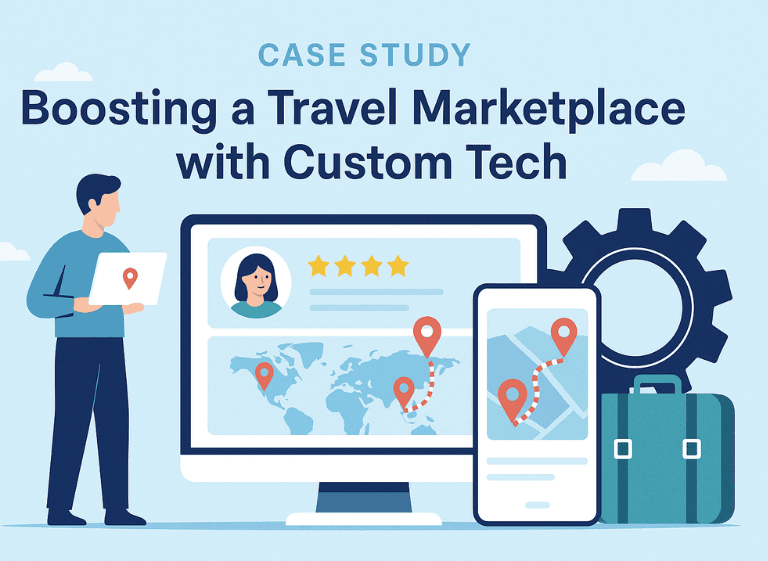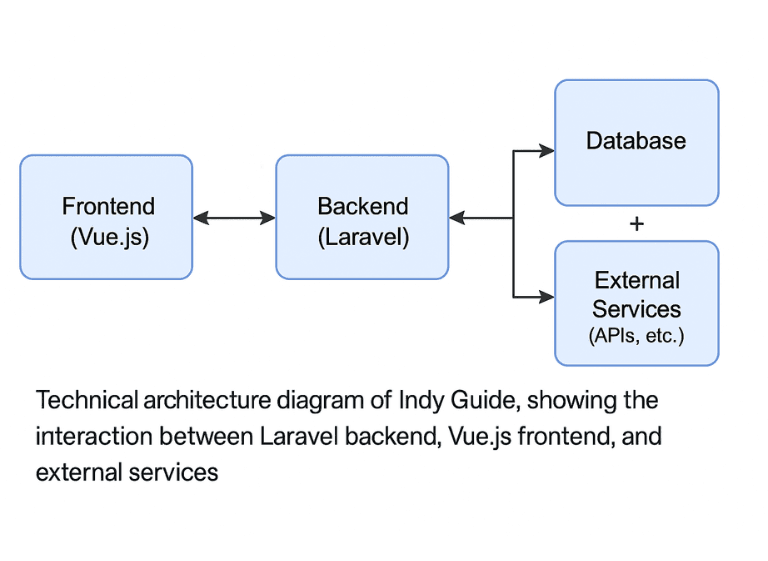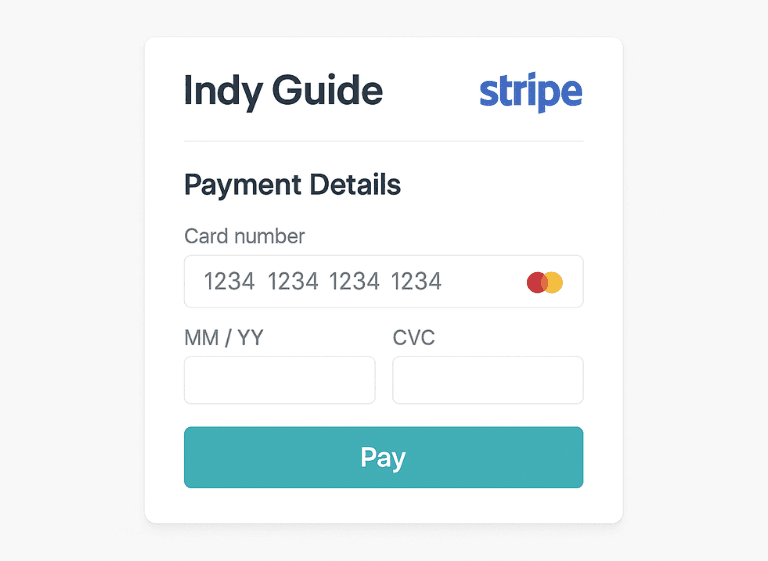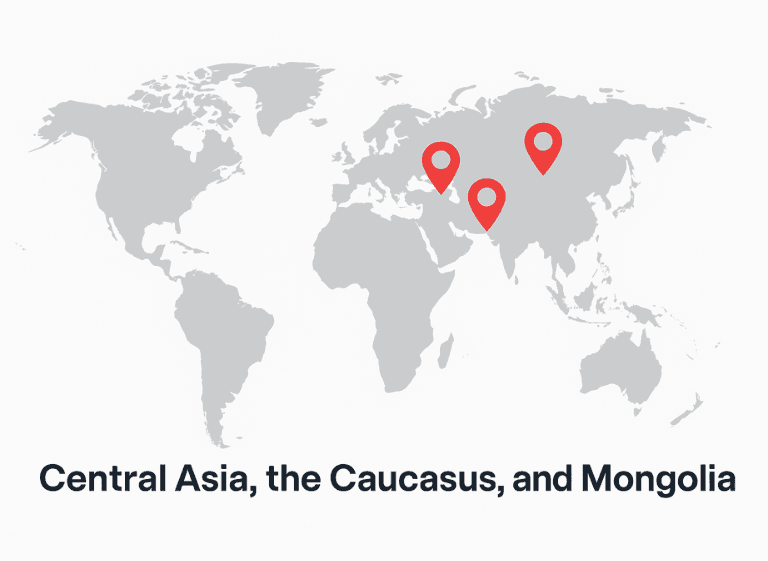Web development
Real project examples
Performance optimization
UI/UX Design
SEO optimization
Security practices
Case Study: Boosting a Travel Marketplace with Custom Tech
Nadiia Sidenko
2025-06-25
Travel marketplaces face a fundamental challenge: connecting global travelers with local providers while maintaining trust, security, and seamless user experience. When building scalable travel platform architecture, technical decisions made during initial development determine whether the platform can handle rapid growth or collapse under increased load.

This travel tech case study examines how we built Indy Guide's marketplace for local guides using Laravel for marketplaces, Vue.js booking UX, and strategic integrations with payment providers and geo tools for tourism platforms. The technical approach demonstrates best practices for creating booking system architecture that supports sustainable growth.
Scalable travel platforms: what makes them work
Travel marketplace tech stack requirements differ significantly from standard e-commerce solutions. Niche marketplace tech must handle complex geographical data, variable pricing models, multi-currency transactions, and trust-building mechanisms for providers across different markets and economic conditions.
Performance optimization in travel apps becomes critical when serving users across varying network conditions globally. The platform architecture must support real-time availability management, dynamic pricing calculations, multilingual content, and robust verification systems while maintaining consistent response times.
Technical SEO for travel websites requires careful planning from the development phase. Search engines need to crawl dynamic content including provider profiles, experience descriptions, and user-generated reviews. This is where UX and big data influence travel service success, creating competitive advantages through optimized booking flows and personalized recommendations.
Building Indy Guide: Laravel + Vue.js architecture for 2000+ local guides
The best tech stack for travel marketplace operations combines Laravel's robust backend capabilities with Vue.js frontend performance. This pairing provides the scalability needed for provider onboarding while maintaining responsive user experience essential for booking conversions.

Technical architecture diagram of Indy Guide, showing the interaction between Laravel backend, Vue.js frontend, and external services.
Why Laravel helped us scale securely
Laravel for marketplaces offers built-in security features that travel platforms require: CSRF protection, SQL injection prevention, and encrypted data storage. The framework's queue system handles resource-intensive operations like image processing and automated communications without impacting user-facing performance.
The Eloquent ORM simplifies complex geographical queries needed for location-based search functionality. When processing location searches, the system efficiently handles coordinates, calculates distances, and filters by availability across multiple time zones. Laravel's caching mechanisms reduce database load by storing frequently accessed location data and provider information.
Laravel's package ecosystem provides pre-built solutions for payment processing, image optimization, and API integrations. This reduces development complexity while ensuring reliable performance across different components of the travel booking platform.
Key Laravel advantages for travel marketplace development:
- Built-in queue system for handling resource-intensive operations
- Eloquent ORM for complex geographical data queries
- Comprehensive caching mechanisms for location and provider data
- Extensive security features including CSRF protection and encrypted storage
- Rich package ecosystem reducing custom development requirements
Frontend experience: Vue.js for intuitive bookings
Vue.js travel booking UI performance directly impacts user engagement during the booking process. The framework's reactive data binding creates smooth interactions during multi-step booking flows, where users select dates, group sizes, add-ons, and payment methods without page reloads.
Component-based architecture enables systematic testing and optimization of booking flows. Vue.js components can be modified and deployed efficiently, supporting continuous improvement based on user feedback and performance data.
Progressive web app capabilities ensure consistent performance across devices and network conditions. Offline functionality allows users to browse previously viewed content and complete bookings when connectivity returns, addressing connectivity challenges in various geographic markets.
Our experience creating platforms for 2000+ guides demonstrates how Vue.js enables rapid development iteration while maintaining code quality and performance standards across different user scenarios.
Why Stripe and PayPal were the best fit for Indy Guide
Payment processing in travel marketplaces requires sophisticated handling beyond basic transactions. The system must support split payments between platform fees and provider payouts, manage refunds for cancelled experiences, handle security deposits, and operate across multiple currencies with transparent fee structures.
Stripe integration for travel bookings provides advanced fraud detection essential for international transactions. The platform's algorithms identify suspicious patterns while minimizing false positives that could block legitimate bookings from travelers in different regions.
Example payment interface concept for Indy Guide, illustrating the Stripe-based checkout experience (not an actual production screenshot).

PayPal integration addresses trust concerns in markets where credit card adoption varies. Many travelers prefer PayPal's buyer protection policies for international bookings, especially when booking experiences in unfamiliar destinations. The dual payment option provides flexibility for different user preferences.
The technical implementation supports automatic currency conversion, tax calculation based on provider location, and compliance with international payment regulations. Stripe and PayPal for travel apps handle PCI compliance requirements, reducing security overhead for the development team.
| Payment Feature | Stripe Benefits | PayPal Benefits |
|---|---|---|
| International Coverage | Multiple countries, local payment methods | Global reach, familiar interface |
| Fraud Protection | Machine learning detection, real-time scoring | Buyer protection, dispute resolution |
| Developer Tools | Comprehensive APIs, webhook support | Streamlined integration, sandbox testing |
| Compliance | PCI compliance, regulatory adherence | International standards, seller protection |
Supporting niche destinations with smart geo tools
Google Maps API integration travel app functionality extends beyond basic location display. The platform uses geocoding for address validation, reverse geocoding for location suggestions, and distance calculations for itinerary optimization.
Geo tools for tourism platforms enable location-based features including dynamic search results, proximity calculations, and route planning capabilities. The system helps travelers discover experiences based on their location preferences and travel patterns.
The Places API integration assists providers in creating detailed experience descriptions by suggesting relevant landmarks, restaurants, and transportation options. This reduces content creation complexity while improving search optimization through structured location data.
Advanced mapping features include custom markers for different experience categories, geographic search filtering, and location-based recommendations. These tools help travelers plan comprehensive itineraries while maximizing provider visibility across different service areas.
Helping local guides reach global travelers
The marketplace for local tour guides platform creates connections between providers in various regions and international travelers seeking authentic experiences. The platform supports economic opportunities while maintaining quality standards and user trust.

How verified providers build trust in emerging markets
Trust-building mechanisms become essential when connecting international travelers with local providers. The verification system combines identity verification, reference checks, and graduated permission levels based on performance history and platform engagement.
New providers begin with basic listing capabilities and standard search visibility. Successful completion of initial experiences unlocks additional features including enhanced booking options, improved search ranking, and premium listing capabilities. This approach protects travelers while providing clear advancement paths for committed providers.
The rating system evaluates multiple aspects of the experience including communication quality, service delivery, safety standards, and overall value. Detailed feedback categories help travelers make informed decisions while providing providers with specific improvement guidance.
Verified provider profiles display relevant credentials, response times, language capabilities, and service history. The system shows provider activity levels and engagement metrics, building confidence in active, professional guides rather than inactive listings.
Tech choices that support long-term SEO and growth
SEO for travel startups requires architectural decisions implemented during initial development rather than added later. The platform uses server-side rendering for Vue.js components, ensuring search engines can crawl and index dynamic content including provider profiles and experience descriptions.
Technical implementation includes structured data markup for experiences, providers, and reviews. This enables enhanced search result displays with ratings, pricing, and availability information directly visible in search listings. Local SEO optimization helps providers rank for location-specific searches in their service areas.
The URL structure supports scalable content architecture with descriptive paths for experience categories and geographic regions. Automated sitemap generation ensures new content gets indexed efficiently as the platform expands into additional markets.
Performance optimization includes image compression, content delivery network integration, and database query optimization to maintain fast loading speeds as content volume increases. Site performance impacts both search engine rankings and user experience quality.
| SEO Implementation Area | Technical Solution | Platform Impact |
|---|---|---|
| Content Indexing | Server-side rendering, automated sitemaps | Enhanced search visibility |
| Page Performance | CDN integration, image optimization | Improved user experience |
| Local Discovery | Structured data, geographic targeting | Better provider findability |
| Mobile Optimization | Progressive web app, responsive design | Cross-device accessibility |
Conversion optimization travel booking UX encompasses both interface design and technical performance factors. Fast loading times, smooth navigation, and reliable payment processing create the foundation for successful booking experiences across different user scenarios.
Travel platform growth requires technical scalability that supports business expansion without requiring complete system rebuilds. How to scale booking platform with Laravel involves implementing caching strategies, queue-based processing for intensive operations, and database optimization techniques.
The Laravel backend scales through load balancing and database optimization techniques, while Vue.js frontend components maintain performance as feature complexity increases. These technical foundations enable sustainable growth while preserving consistent performance and user experience standards across expanding provider networks and geographic markets.

Key takeaways for product teams and travel tech founders
Building a successful travel marketplace requires strategic technical decisions that balance immediate functionality with long-term scalability. How to scale travel startup operations depends on choosing technologies that support rapid geographic expansion while maintaining consistent user experience across diverse markets and network conditions.
Critical architecture decisions that cannot be retrofitted later:
The tech strategy for travel product development must prioritize trust-building mechanisms from the initial architecture phase. Payment processing, provider verification, and user safety features cannot be effectively added to existing systems. These core components require careful integration during the foundational development stage.
Product development for booking platforms benefits from component-based frontend architecture that enables rapid iteration and A/B testing. The ability to modify booking flows, test different user interfaces, and deploy changes quickly directly impacts conversion optimization and user satisfaction rates.
Geographic expansion challenges for travel marketplace case insights:
Supporting multiple currencies, languages, payment methods, and local regulations requires architectural flexibility that standard e-commerce solutions often cannot provide. The platform must accommodate varying internet connectivity, device capabilities, and user behavior patterns across different regions.
Provider onboarding processes significantly impact marketplace growth velocity. Technical systems that reduce content creation barriers while maintaining quality standards enable faster network expansion.
Automated tools for profile creation, experience descriptions, and pricing guidance help providers establish professional presence without extensive marketing expertise.
Essential technical priorities from our development experience:
Payment infrastructure selection proves the most critical technical decision. Supporting both global payment providers and regional preferences increases booking completion rates while reducing transaction abandonment. The payment system architecture must handle split payments, refunds, and international compliance requirements from the initial implementation.
Performance optimization across varying network conditions requires careful technical planning. Progressive web app capabilities, offline functionality, and efficient data loading strategies address connectivity challenges in emerging markets while maintaining premium user experience for travelers from developed regions.
The verification and trust systems prove essential for international marketplace success. Graduated permission levels, performance-based feature unlocking, and comprehensive review mechanisms create sustainable quality control while providing clear advancement pathways for serious providers.
Long-term growth considerations:
SEO and content architecture decisions made during initial development determine long-term organic growth potential. Server-side rendering, structured data implementation, and scalable URL structures cannot be effectively added to existing platforms without significant rebuilding efforts.
For travel tech founders evaluating technical approaches, the Laravel and Vue.js combination provides proven scalability for marketplace operations while maintaining development velocity. The framework ecosystem supports complex travel-specific requirements including geographic data processing, multi-currency operations, and international payment integration.
Product teams should prioritize mobile-first design and cross-device consistency from the development start. Travel booking behavior varies significantly across desktop and mobile platforms, requiring optimized experiences for both contexts without compromising functionality or security standards.